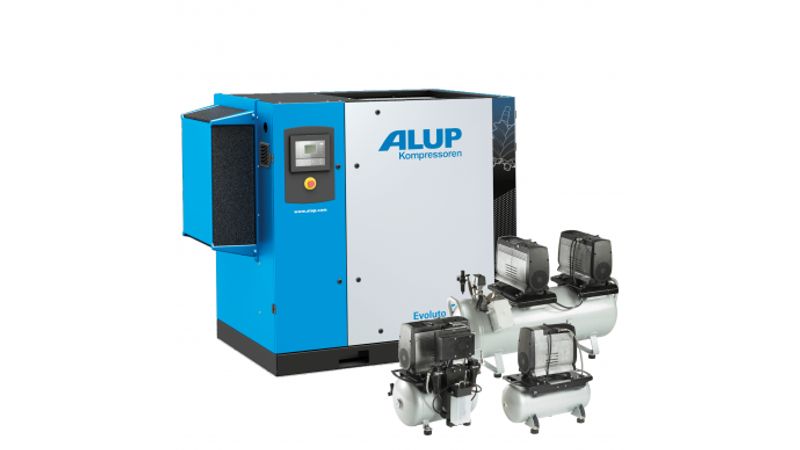Screw and piston compressors
Oil-lubricated and oil-free air compressors
Part description
How does a screw compressor work?
A screw compressor compresses air into compressed air using two screws or rotors that rotate inside a casing. The screws are precisely positioned relative to each other, so that they do not touch, creating small openings or chambers between the screws. These chambers become smaller as the screws rotate, forcing the air/gas to compress and flow out through the exhaust.
How does a piston compressor work?
A piston compressor is a type of air compressor that compresses air into compressed air by moving a piston back and forth inside a cylinder. When the piston moves down, air or gas is drawn into the cylinder through an intake valve. When the piston moves up, the air or gas is compressed in the cylinder and discharged through an exhaust valve into the storage tank or compressed air network.
Types of screw compressors
There are two types of screw compressors: oil-injected and oil-free. In oil-injected compressors, oil is injected into the compressor to reduce wear and provide better sealing between the screws. In oil-free compressors, no oil is used, ensuring that no contaminants enter the gas, making them cleaner.
*Since intake air is drawn from the outside, even in an oil-free compressor, oil vapors may still be present.
Types of piston compressors
There are two types of piston compressors: single-acting and double-acting piston compressors. Single-acting compressors have one piston that compresses air or gas with each stroke. Double-acting compressors have two pistons working simultaneously to compress air or gas, increasing the output and efficiency of the compressor.
Applications of screw compressors
Screw compressors can be used in many different industries for various applications. Some examples of industries where screw compressors are used:
- Manufacturing: Screw compressors are often used in the manufacturing industry to provide compressed air for pneumatic tools and machines. They can also be used for cleaning parts and operating machines.
- Food Industry: Screw compressors are used in the food and beverage industry to provide compressed air for packaging food and beverages and for operating machines used in food and beverage production.
- Medical Industry: Screw compressors are used in the medical industry for applications such as powering medical equipment and providing compressed air for operating rooms and respiratory equipment.
- Automotive Industry: Screw compressors are used in the automotive industry to operate tools and machinery, such as sanders and spray equipment.
Applications of piston compressors
Piston compressors are used in a wide range of industries and applications due to their ability to produce compressed air at high pressures and capacities. Here are some examples of industries where piston compressors are frequently used:
- Automotive Industry: Piston compressors are used to operate pneumatic tools such as sanders and impact wrenches in garages and auto repair shops.
- Manufacturing: Piston compressors are used in manufacturing environments to operate machines and equipment, such as pneumatic tools, conveyors, and in the food industry to support food packaging.
- Construction: Piston compressors are often used in the construction sector to power pneumatic tools such as jackhammers, drills, nail guns, and other equipment.
Benefits of screw compressors
- Reliable
- Energy-efficient
- Continuous power
- Quiet operation
- Easy to use
- Low maintenance costs
Benefits of piston compressors
- High pressure capabilities
- Affordable
- Compact size
- Easy to use
- Portable
Need advice on compressors?
Feel free to contact us for more information. For a free consultation, you can reach our product specialist Patrizia Callenbach at +31 (0)6 57 42 00 91.
 EN
EN
 NL
NL PL
PL 

